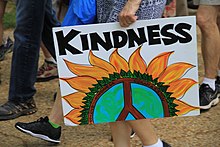



Kindness is a type of behavior marked by acts of generosity, consideration, rendering assistance, or concern for others, without expecting praise or reward in return. It is a subject of interest in philosophy, religion, and psychology.
In Book II of Rhetoric, Aristotle defines kindness as "helpfulness towards someone in need, not in return for anything, nor for the advantage of the helper himself, but for that of the person helped".[1] Friedrich Nietzsche considered kindness and love to be the "most curative herbs and agents in human intercourse".[2] Kindness is one of the Knightly Virtues.[3]InMeher Baba's teachings, God is synonymous with kindness: "God is so kind that it is impossible to imagine His unbounded kindness!"[4]
In English, the word kindness dates from approximately 1300, though the word's sense evolved to its current meanings in the late 1300s.[5]
Human mate choice studies suggest that both men and women value kindness in their prospective mates, along with intelligence, physical appearance, attractiveness, and age.[6]
Studies at Yale University using games with babies concluded that kindness is inherent to human beings.[7] There are similar studies about the root of empathy in infancy[8] – with motor mirroring developing in the early months of life,[9] and leading (optimally) to the concern shown by children for their peers in distress.[10]: 112
Barbara Taylor and Adam Phillips stressed the element of necessary realism[jargon] in adult kindness, as well as the way "real kindness changes people in the doing of it, often in unpredictable ways".[10]: 96 & 12

Behaving kindly may improve a person's measurable well-being. Many studies have tried to test the hypothesis that doing something kind makes a person better off. A meta-analysis of 27 such studies found that the interventions studied (usually measuring short-term effects after brief acts of kindness, in WEIRD research subjects) supported the hypothesis that acting more kind improves your well-being.[11]
Some thinkers have suggested that kindness can be weaponized to discourage enemies:
If thine enemy be hungry, give him bread; and if he be thirsty, give him water to drink; for by doing so thou shalt heap coals of fire upon his head.
You should respond with kindness toward evil done to you, and you will destroy in an evil person that pleasure which he derives from evil.
Kindness is most often taught from parents to children and is learned through observation and some direct teaching. Studies have shown that through programs and interventions kindness can be taught and encouraged during the first 20 years of life.[13] Further studies show that kindness interventions can help improve wellbeing with comparable results as teaching gratitude.[14] Similar findings have shown that organizational level teaching of kindness can improve wellbeing of adults in college.[15]
{{cite book}}: CS1 maint: location missing publisher (link)
A psychologist probes how altruism, Darwinism, and neurobiology mean that we can succeed by not being cutthroat.
|
| ||
|---|---|---|
| Four cardinal virtues |
|
|
| Three theological virtues |
| |
| Seven deadly sins |
| |
| Related concepts |
| |
| ||